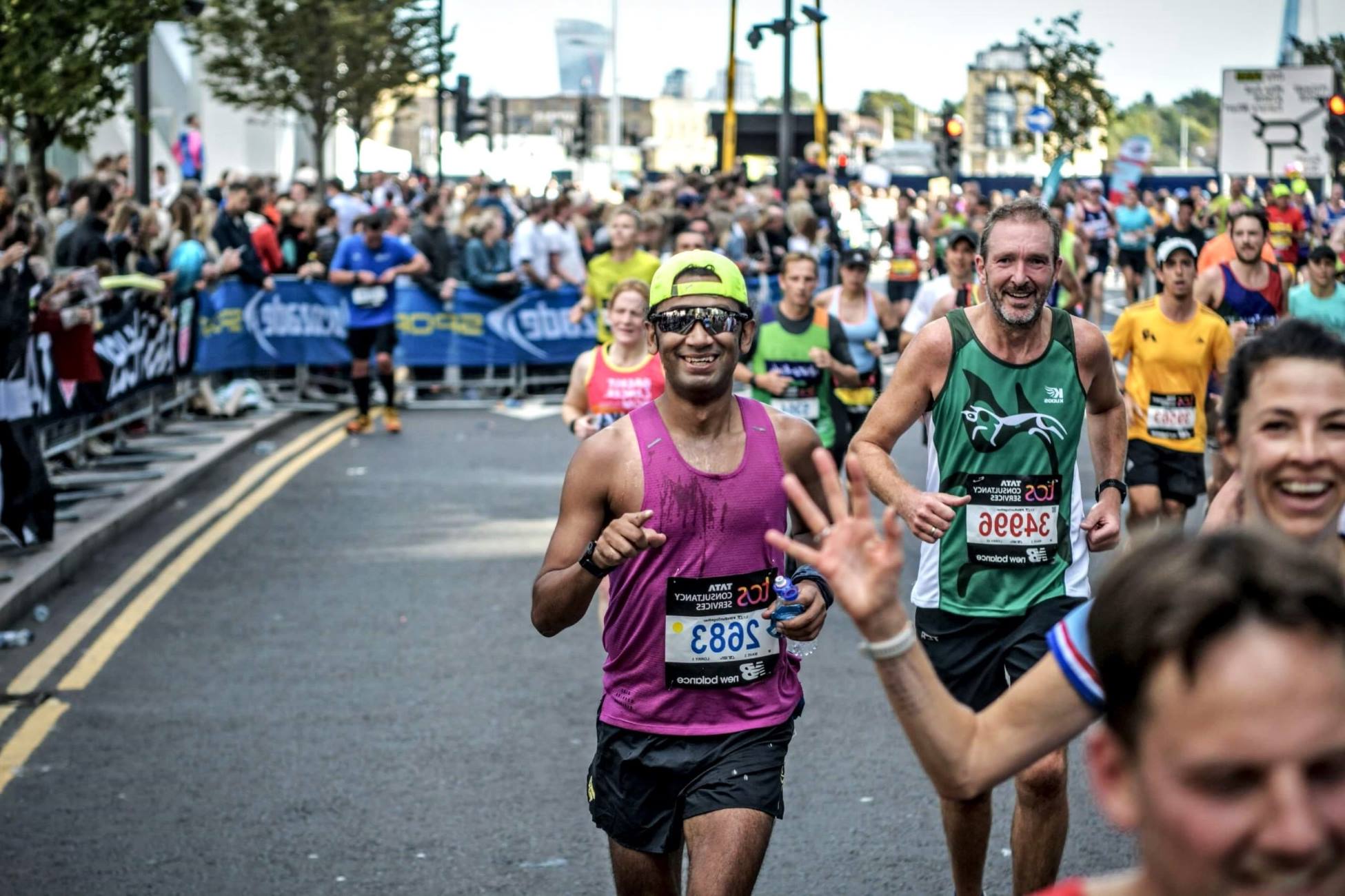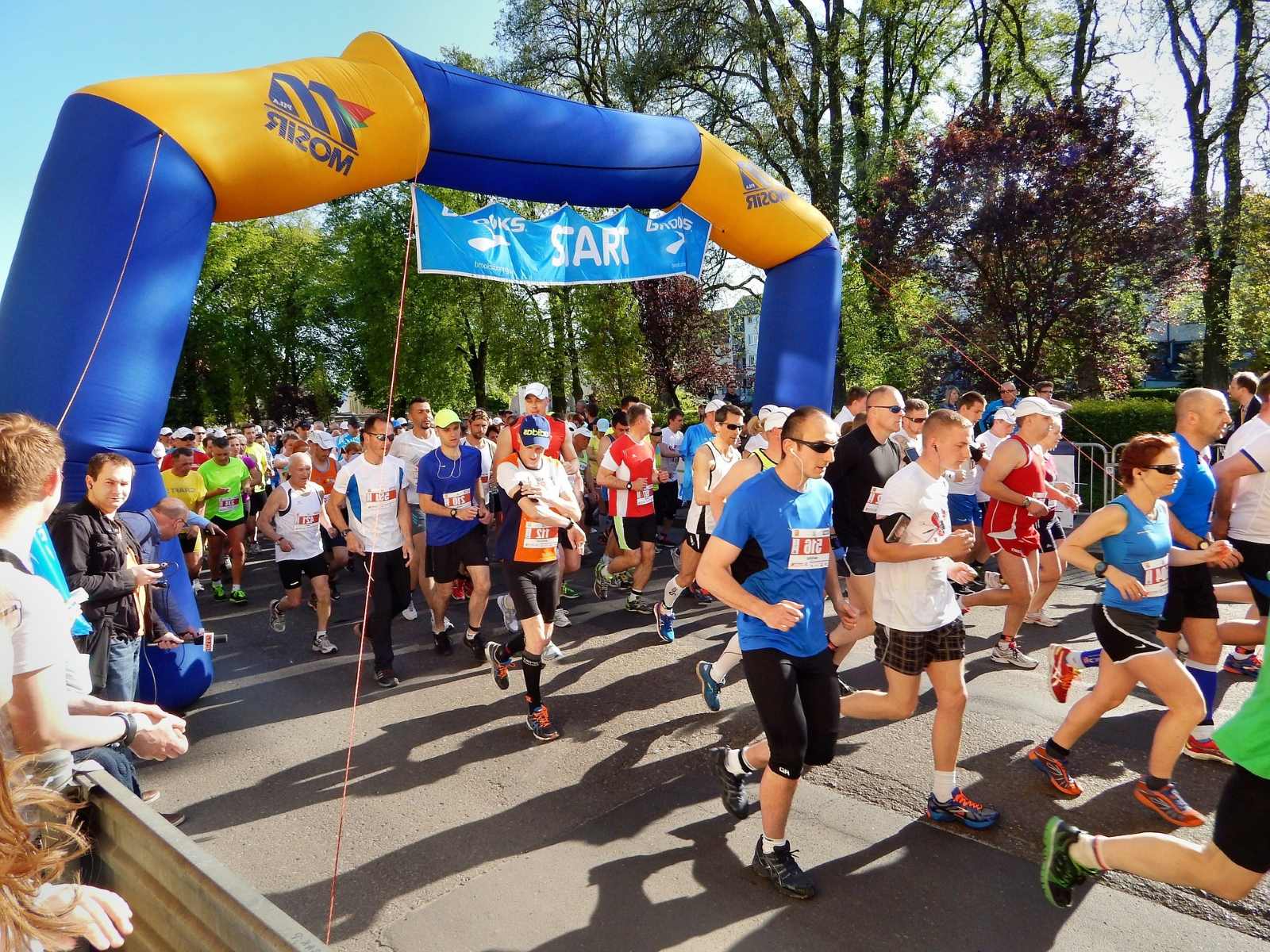Home>Training & Techniques>Training Plans>Achieve A Sub-five Hour Finish With This Comprehensive Marathon Training Plan


Training Plans
Achieve A Sub-five Hour Finish With This Comprehensive Marathon Training Plan
Published: March 2, 2024
Get ready to conquer your marathon goal with our comprehensive training plan designed to help you achieve a sub-five hour finish. Perfect for runners seeking effective and proven training plans. Start your journey today!
(Many of the links in this article redirect to a specific reviewed product. Your purchase of these products through affiliate links helps to generate commission for Therunningadvisor.com, at no extra cost. Learn more)
Table of Contents
Introduction
Embarking on a marathon journey is a monumental endeavor that requires dedication, perseverance, and a well-structured training plan. Whether you're a seasoned runner aiming to achieve a personal best or a novice seeking to conquer the 26.2-mile distance for the first time, a comprehensive training plan is essential for success. This article will guide you through a marathon training plan designed to help you achieve a sub-five hour finish, providing valuable insights and strategies to support your journey.
As you delve into the world of marathon training, it's crucial to approach the process with a blend of enthusiasm and respect for the challenge ahead. The road to a sub-five hour marathon finish demands commitment, both physically and mentally. However, with the right training plan and mindset, you can turn this ambitious goal into a reality.
Throughout this comprehensive training plan, you'll discover the key components that contribute to a successful marathon experience. From building your base mileage and incorporating speed work to understanding the importance of long runs and recovery, each aspect plays a vital role in preparing your body and mind for the demands of the marathon distance.
Moreover, this training plan will delve into the significance of nutrition, hydration, and mental preparation, shedding light on how these elements can significantly impact your performance on race day. By equipping yourself with a holistic understanding of marathon training, you'll be better prepared to tackle the challenges that lie ahead and optimize your chances of achieving a sub-five hour finish.
As you immerse yourself in this training plan, remember that every step you take and every mile you conquer brings you closer to your goal. Embrace the journey, celebrate your progress, and stay committed to the process. With determination, perseverance, and the guidance provided in this training plan, you'll be well-equipped to pursue your sub-five hour marathon finish with confidence and determination.
Setting Your Marathon Goals
Setting clear and realistic marathon goals is the foundational step in your journey towards a sub-five hour finish. Your goals should align with your current fitness level, experience, and the specific challenges of the marathon distance. Whether you're aiming to complete your first marathon or striving to improve your previous performance, establishing well-defined objectives will provide a roadmap for your training plan.
When setting your marathon goals, consider factors such as your current running ability, previous race times, and the time frame in which you plan to achieve your sub-five hour finish. It's essential to strike a balance between ambition and feasibility, ensuring that your goals push you to excel while remaining within reach.
Additionally, take into account the terrain and conditions of the marathon you intend to participate in. Factors such as elevation changes, weather patterns, and course difficulty can influence your performance and should be factored into your goal-setting process.
Furthermore, consider setting both outcome-based goals and process-oriented goals. Outcome-based goals focus on the end result, such as achieving a sub-five hour finish, while process-oriented goals revolve around the steps and strategies you'll implement during training. By incorporating both types of goals, you create a comprehensive framework that encompasses your desired outcome and the actionable steps required to reach it.
It's important to approach goal-setting with a growth-oriented mindset, acknowledging that progress and improvement are gradual processes. Embrace the journey and recognize that each milestone, whether it's a new personal best in a shorter race or a successful long run during training, contributes to your overall marathon goals.
By establishing clear, realistic, and multifaceted marathon goals, you lay the groundwork for a purposeful and focused training plan. These goals will serve as beacons of motivation, guiding your efforts and shaping your approach to training as you strive to achieve a sub-five hour marathon finish.
Understanding the Training Plan
Understanding the intricacies of the training plan is pivotal in preparing for a marathon, especially when aiming for a sub-five hour finish. The training plan serves as a structured roadmap, guiding runners through the physical and mental preparation required to conquer the 26.2-mile distance. It encompasses a series of progressive workouts, rest days, and strategic elements designed to optimize performance and minimize the risk of injury.
At the core of the training plan lies the principle of progressive overload, a gradual increase in training volume and intensity to stimulate physiological adaptations. This gradual progression is essential for building endurance, strength, and mental resilience, all of which are crucial for marathon success. The training plan typically spans several months, allowing for a systematic buildup of fitness and mileage while minimizing the likelihood of overtraining.
A well-designed marathon training plan incorporates a variety of workouts, including long runs, speed work, tempo runs, and recovery runs. Each type of workout serves a specific purpose, contributing to the overall development of a runner's physical and mental capabilities. Long runs, for instance, are instrumental in building endurance and mental fortitude, preparing runners for the demands of the marathon distance. Speed work, on the other hand, focuses on improving running economy and anaerobic capacity, enhancing overall race performance.
Furthermore, the training plan integrates rest and recovery days, acknowledging the importance of allowing the body to recuperate and adapt to the training stimulus. Adequate rest is essential for injury prevention and performance optimization, ensuring that runners remain fresh and energized for key workouts and long runs.
In addition to the physical aspects, the training plan also addresses the mental and emotional components of marathon preparation. It cultivates mental toughness, resilience, and race-day strategies, equipping runners with the psychological tools needed to overcome challenges and push through fatigue during the marathon.
Understanding the training plan involves recognizing the symbiotic relationship between training, recovery, and adaptation. It requires a holistic perspective that acknowledges the interconnectedness of physical, mental, and emotional elements in preparing for a marathon. By comprehending the nuances of the training plan and embracing its multifaceted nature, runners can approach their marathon journey with clarity, purpose, and confidence, setting the stage for a successful pursuit of a sub-five hour finish.
Building Your Base Mileage
Building your base mileage forms the cornerstone of marathon training, laying the foundation for the physical and mental demands of the 26.2-mile distance. The base mileage phase focuses on gradually increasing the weekly running volume, allowing the body to adapt to the rigors of sustained endurance running. This phase typically spans several weeks, providing a gradual buildup of mileage while minimizing the risk of overuse injuries.
During the base mileage phase, runners prioritize consistency and gradual progression, aiming to develop a solid aerobic foundation. This involves incorporating regular, moderate-paced runs to enhance cardiovascular endurance and muscular resilience. The emphasis is not on speed or intensity but rather on accumulating steady, sustainable mileage to fortify the body for the more demanding phases of training.
A typical approach to building base mileage involves incrementally increasing weekly mileage by no more than 10% to 15% to facilitate adaptation and minimize the risk of overtraining. This gradual progression allows the body to adapt to the increasing training load, fostering physiological changes such as improved capillary density, enhanced mitochondrial function, and strengthened musculoskeletal structures.
Moreover, the base mileage phase provides an opportunity for runners to acclimate to the physical and mental demands of consistent training. It cultivates discipline, resilience, and a sense of routine, laying the groundwork for the more challenging aspects of marathon preparation. Additionally, this phase allows runners to fine-tune their running form, establish a sustainable pace, and develop a keen awareness of their body's signals and limitations.
As runners accumulate base mileage, they also gain valuable insights into their individual recovery needs, nutritional requirements, and injury prevention strategies. This phase serves as a learning experience, enabling runners to refine their self-care routines and establish healthy habits that will support them throughout the entirety of their marathon training journey.
By diligently building base mileage, runners prepare themselves for the subsequent phases of training, setting the stage for the incorporation of speed work, long runs, and race-specific workouts. The base mileage phase instills a sense of confidence, discipline, and physical resilience, equipping runners with a solid foundation upon which to pursue their sub-five hour marathon finish.
Incorporating Speed Work
Incorporating speed work into your marathon training plan is a pivotal element in enhancing your overall race performance and working towards a sub-five hour finish. Speed work encompasses a range of structured workouts designed to improve running economy, anaerobic capacity, and neuromuscular coordination, all of which are essential for marathon success.
One of the most common forms of speed work is interval training, which involves alternating between periods of high-intensity running and active recovery. These intervals can vary in duration and intensity, catering to different physiological adaptations and performance objectives. Shorter, more intense intervals target anaerobic capacity and neuromuscular power, while longer intervals focus on improving aerobic capacity and lactate threshold.
Another key component of speed work is tempo runs, which involve sustained efforts at a challenging, yet sustainable pace. Tempo runs enhance the body's ability to clear lactate and improve the efficiency of oxygen utilization, contributing to improved race pace and overall endurance. These workouts often simulate the demands of marathon race pace, providing valuable physiological and psychological preparation for the rigors of the 26.2-mile distance.
Furthermore, incorporating strides or accelerations into your training regimen can help improve running mechanics, neuromuscular coordination, and running economy. These short bursts of speed, often integrated into easy runs, serve as a form of neuromuscular training, enhancing the recruitment of fast-twitch muscle fibers and refining running form.
It's important to approach speed work with a structured and progressive mindset, gradually introducing these workouts into your training plan to allow for adaptation and minimize the risk of injury. Additionally, integrating speed work strategically within the context of your overall training plan is crucial for balancing the physiological stress of these workouts with adequate recovery and long-term progression.
By incorporating speed work into your marathon training plan, you not only enhance your physical capabilities but also cultivate mental resilience and race-specific preparedness. These workouts challenge your perceived limits, instill confidence in your ability to sustain challenging paces, and foster a deeper understanding of pacing strategies and race execution.
In essence, speed work serves as a catalyst for performance improvement, equipping you with the tools and physiological adaptations necessary to pursue a sub-five hour marathon finish. When integrated thoughtfully and consistently, speed work becomes a cornerstone of your training plan, propelling you towards your marathon goals with confidence and determination.
Long Runs and Recovery
Long runs are a fundamental component of marathon training, playing a pivotal role in building endurance, mental resilience, and race-specific preparedness. These extended efforts, typically conducted once a week, simulate the physical and mental demands of the marathon distance, providing runners with an opportunity to adapt to sustained periods of running and develop the fortitude required for race day.
During long runs, runners gradually increase their mileage, with the goal of extending their endurance and familiarizing themselves with the physical and mental challenges of prolonged exertion. These workouts are not solely about covering distance but also about honing pacing strategies, refining nutrition and hydration practices, and cultivating mental toughness in the face of fatigue.
Moreover, long runs serve as a platform for runners to test and fine-tune their race-day gear, including apparel, footwear, and fueling options. By experimenting with different equipment and nutrition strategies during long runs, runners can identify what works best for them, minimizing the likelihood of unexpected issues on race day.
In parallel to the rigors of long runs, recovery holds equal significance in the marathon training journey. Adequate recovery is essential for allowing the body to adapt to the training stimulus, repair muscle damage, and replenish energy stores. Rest days and easy-paced recovery runs interspersed throughout the training plan provide the necessary respite for physiological and psychological rejuvenation.
Furthermore, recovery encompasses various self-care practices, including proper hydration, nutrition, sleep, and active forms of recovery such as stretching, foam rolling, and cross-training. These elements collectively support the body's adaptation to training, mitigate the risk of overuse injuries, and promote overall well-being throughout the training process.
Understanding the delicate balance between long runs and recovery is crucial for optimizing training adaptations and minimizing the risk of burnout or injury. By strategically integrating recovery days and practices, runners can sustain the consistency and quality of their training, ensuring that each long run contributes to their progression towards a sub-five hour marathon finish.
In essence, long runs and recovery are symbiotic components of marathon training, each playing a vital role in the holistic preparation for the 26.2-mile distance. By embracing the physical and mental challenges of long runs and prioritizing comprehensive recovery strategies, runners fortify themselves for the demands of the marathon, setting the stage for a successful pursuit of their sub-five hour goal.
Nutrition and Hydration
Nutrition and hydration are integral components of marathon training, wielding a profound impact on performance, recovery, and overall well-being. As you strive for a sub-five hour marathon finish, it's essential to prioritize your dietary choices and fluid intake to support the demands of training and race day.
Proper nutrition serves as the fuel that powers your training and facilitates optimal recovery. A well-balanced diet rich in complex carbohydrates, lean proteins, healthy fats, and an array of vitamins and minerals is essential for sustaining energy levels, supporting muscle repair, and bolstering immune function. Carbohydrates, in particular, serve as the primary fuel source for endurance activities, making it crucial to incorporate ample whole grains, fruits, and vegetables into your daily meals.
In the context of marathon training, it's beneficial to pay attention to the timing and composition of your meals, especially before and after long runs and key workouts. Pre-run nutrition should focus on easily digestible carbohydrates to provide readily available energy, while post-run meals should include a blend of carbohydrates and protein to replenish glycogen stores and aid in muscle recovery.
Hydration is equally vital, as proper fluid balance is essential for temperature regulation, nutrient transport, and overall physiological function. Dehydration can significantly impair performance and increase the risk of heat-related illnesses, underscoring the importance of maintaining adequate fluid intake throughout training.
As a marathon trainee, it's crucial to develop a personalized hydration strategy that considers factors such as sweat rate, environmental conditions, and individual fluid needs. Regular hydration, both during training runs and throughout the day, is key to sustaining optimal performance and minimizing the likelihood of dehydration-related issues.
In addition to daily nutrition and hydration practices, it's important to consider race-day fueling strategies. Experimenting with different forms of energy gels, chews, and sports drinks during long runs can help you identify the products that best suit your digestive system and provide sustained energy during the marathon.
By prioritizing sound nutrition and hydration practices, you not only support your physical performance but also cultivate a resilient and robust body capable of enduring the rigors of marathon training. Consistency, mindfulness, and a willingness to adapt and refine your dietary and fluid intake based on your body's feedback are key to optimizing your nutrition and hydration for the pursuit of a sub-five hour marathon finish.
Mental Preparation
Mental preparation is a critical yet often overlooked aspect of marathon training, playing a profound role in shaping the outcome of the race. As you strive for a sub-five hour finish, cultivating mental resilience, fortitude, and race-specific strategies is essential for navigating the challenges of the marathon distance.
One of the primary components of mental preparation is developing a positive and resilient mindset. The marathon journey is rife with physical and mental obstacles, and maintaining a constructive outlook can significantly impact your ability to overcome adversity. Embracing a growth-oriented perspective, acknowledging setbacks as learning opportunities, and fostering self-belief are pivotal in fortifying your mental resilience.
Visualization and mental imagery also form integral components of mental preparation. By vividly envisioning yourself crossing the finish line with strength and determination, you not only reinforce your resolve but also familiarize your mind with the sensations and emotions associated with success. Visualizing challenging segments of the race and rehearsing your response to fatigue or discomfort can equip you with mental strategies to navigate these moments effectively.
Furthermore, incorporating mindfulness and stress-reduction techniques into your training routine can help cultivate a calm and focused mindset. Practices such as meditation, deep breathing exercises, and visualization can mitigate pre-race jitters, enhance concentration, and promote a sense of mental clarity amidst the intensity of marathon preparation.
Race-specific mental preparation involves developing pacing strategies, contingency plans, and adaptive thinking. By familiarizing yourself with the course terrain, elevation changes, and potential race-day scenarios, you can formulate a comprehensive mental blueprint that prepares you for the demands of the race. Additionally, cultivating adaptability and resilience in the face of unforeseen circumstances can empower you to navigate race-day challenges with composure and determination.
In essence, mental preparation is not merely a complement to physical training but an indispensable component of marathon readiness. By nurturing a resilient mindset, harnessing the power of visualization, and honing race-specific mental strategies, you fortify yourself for the rigors of the marathon, setting the stage for a resolute pursuit of your sub-five hour finish.
Race Day Strategies
Race day strategies encompass a comprehensive approach to optimizing your performance and experience during the marathon. As you prepare for your sub-five hour finish, strategic planning, mental fortitude, and adaptive tactics are essential for navigating the intricacies of race day.
Pacing is a cornerstone of race day strategy, particularly in the context of pursuing a sub-five hour finish. Establishing a well-defined pacing plan that aligns with your training and race goals is crucial for conserving energy early in the race and ensuring a strong finish. By adhering to a disciplined pacing strategy, you can mitigate the risk of starting too fast and encountering fatigue in the latter stages of the marathon.
Moreover, mental resilience and adaptability play a pivotal role in race day success. Anticipating and preparing for the inevitable ebbs and flows of the marathon, both physically and emotionally, empowers you to navigate challenging moments with composure and determination. Embracing a flexible mindset that accommodates unforeseen circumstances, such as changes in weather or unexpected race conditions, enables you to adjust your approach while staying focused on your sub-five hour goal.
Strategic fueling and hydration are critical components of race day success. Implementing a well-rehearsed nutrition and hydration plan, informed by your training experiences, ensures that you sustain optimal energy levels and fluid balance throughout the marathon. By strategically consuming fuel and fluids at predetermined intervals, you support your physical performance and minimize the risk of hitting the proverbial "wall" in the later stages of the race.
Additionally, leveraging the support of spectators, fellow runners, and race volunteers can provide a significant mental and emotional boost during the marathon. Embracing the camaraderie and encouragement of the running community can bolster your spirits and fortify your resolve, particularly during challenging segments of the race.
Ultimately, race day strategies are a culmination of your physical preparedness, mental fortitude, and adaptive prowess. By approaching the marathon with a well-crafted plan, a resilient mindset, and a willingness to adapt to the dynamic nature of the race, you position yourself for a successful pursuit of your sub-five hour finish.
Conclusion
As you approach the conclusion of this comprehensive marathon training plan aimed at achieving a sub-five hour finish, it's essential to reflect on the multifaceted journey you've embarked upon. The pursuit of a marathon goal, particularly one as ambitious as a sub-five hour finish, demands unwavering commitment, perseverance, and a holistic approach to training. Throughout this training plan, you've delved into the intricacies of goal-setting, base mileage building, speed work, long runs, recovery, nutrition, hydration, mental preparation, and race day strategies, each playing a pivotal role in shaping your marathon readiness.
The significance of setting clear and realistic marathon goals cannot be overstated. Your goals serve as guiding beacons, shaping your training approach and providing a sense of purpose and direction. By establishing well-defined objectives that align with your abilities and aspirations, you've laid the groundwork for a purposeful and focused training journey.
Building base mileage has fortified your physical and mental resilience, laying the foundation for the more demanding phases of training. The gradual progression of mileage, coupled with the discipline and consistency required during this phase, has honed your endurance and fortitude, preparing you for the rigors of marathon preparation.
Incorporating speed work has enhanced your running economy, anaerobic capacity, and mental fortitude, equipping you with the tools necessary to sustain challenging paces and optimize your overall race performance. These structured workouts have not only bolstered your physical capabilities but also cultivated mental resilience and race-specific preparedness.
Long runs and recovery have provided invaluable insights into the physical and mental demands of sustained endurance running. These extended efforts, coupled with comprehensive recovery strategies, have fortified your body and mind, preparing you for the challenges of the marathon distance.
Nutrition and hydration have served as the fuel that powers your training and sustains your overall well-being. By prioritizing sound dietary choices and fluid intake, you've cultivated a resilient and robust body capable of enduring the rigors of marathon training.
Mental preparation has equipped you with the psychological tools necessary to navigate the mental and emotional challenges of the marathon. By fostering a positive and resilient mindset, harnessing the power of visualization, and honing race-specific mental strategies, you've fortified yourself for the rigors of the marathon.
Race day strategies have provided a comprehensive framework for optimizing your performance and experience during the marathon. Your disciplined pacing, strategic fueling and hydration, and adaptive mindset position you for a successful pursuit of your sub-five hour finish.
As you stand on the brink of your marathon journey, armed with a comprehensive training plan and a resolute mindset, remember that every step you've taken and every milestone you've achieved has brought you closer to your goal. Embrace the challenges that lie ahead, draw strength from your preparation, and approach race day with confidence and determination. Your pursuit of a sub-five hour marathon finish is a testament to your dedication and resilience, and as you cross the finish line, know that every aspect of this training plan has contributed to your success. Embrace the journey, celebrate your achievements, and savor the realization of your marathon goal.














